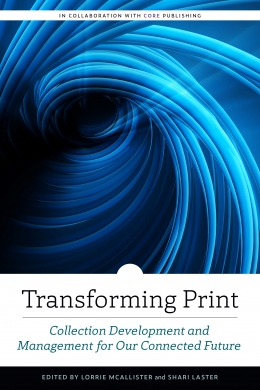Primary tabs
You don't need to be an ALA Member to purchase from the ALA Store, but you'll be asked to create an online account/profile during checkout to proceed. This Web Account is for both Members and non-Members. Note that your ALA Member discount will be applied at the final step of the checkout process.
If you are Tax-Exempt, please verify that your account is currently set up as exempt before placing your order, as our new fulfillment center will need current documentation. Learn how to verify here.
- Description
- Table of Contents
- About the authors
- Reviews
In this book, collection management staff at academic libraries will find fertile ideas for transforming print collections to become more engaging and widely used by the diverse communities they serve.
The trend in academic library collections is toward shared print collections and off-site storage. While that might seem to presage the death of print in academic collections, it also serves as a golden opportunity for innovation and experimentation—to develop a vision for a future in which the academic library print collection engages and inspires its communities as never before. Editors McAllister and Laster led Arizona State University’s Future of Print project, an initiative focused on fostering engagement with print collections by emphasizing unique local holdings of interest to their community. In this collection they share their experiences alongside a range of contributors at other institutions, together exploring how to transform print throughout the collections lifecycle, from selection to management to disposition. Spotlighting the ways in which people and books are central to fulfilling the library’s educational mission, this book’s case studies discuss
- the "Open Stacks" concept and methodologies being developing at ASU;
- what we can learn from browsing behaviors;
- haptic learning and information literacy;
- new pathways for print collections such as indie tarot decks;
- Latin American collections in American research libraries;
- the St. Louis Model for Shared Regional collection as an approach for arranging cooperative FDLP collections outside consortial settings;
- efforts toward increasing inclusion in library collections at the University of Denver;
- an overview of the Rosemont Shared Print Alliance and the Partnership for Shared Book Collections; and
- an open digital future for the Library of Congress.
Introduction
Part I Contemporary Collection Development
Chapter 1 The New Open Stacks
Lorrie McAllister
Chapter 2 No, It’s Not Online; It’s in the Stacks: Latin American Collections in US Academic and Research Libraries
Sócrates Silva and Manuel Ostos
Chapter 3 Working Toward Human-Centered, Reparative Change through Print Collection Development at the University of Denver
Jennifer Bowers, Katherine Crowe, Peggy Keeran, Jack Maness, Denisse Solis, and Shannon Tharp
Part II Collections Access and Management
Chapter 4 The St. Louis Model: Depository Collections at the Confluence
Rebecca C. Hyde
Chapter 5 Old Texts, New Networks: HathiTrust and the Future of Shared Print
Heather Weltin and Natalie Fulkerson
Chapter 6 Opening up Collections at the Nation’s Largest Library: Transformational Digital Access to the Library of Congress
Michael Neubert and Michael Matos
Part III Centering the User
Chapter 7 Hand in Hand: Collections for Haptic and Object-Based Learning
Jae Jennifer Rossman
Chapter 8 A Creative Exercise: Faculty Practices and Preferences for Browsing the Stacks
Sarah Pickle
Chapter 9 Divining a Future of Engagement: Collecting Indie Tarot Decks for MIT
Emilie Hardman
About the Contributors
Index
Lorrie McAllister
Lorrie McAllister is Associate University Librarian for Collection Services and Analysis at Arizona State University, where she is responsible for information resources services related to all segments of the print and digital collections lifecycle, including facilitation of access to information resources through selection, acquisition, licensing, description, management, access, and preservation. McAllister also advocates for strategic initiatives and projects through establishing partnerships, working with collaborators, and writing grants.
Shari Laster
Shari Laster is the Head of Open Stack Collections at Arizona State University Library. She has extensive prior experience as a government information librarian.
Core
The former Association for Library Collections and Technical Services (ALCTS), the Library Information Technology Association (LITA), and the Library Leadership and Management Association (LLAMA) are now Core: Leadership, Infrastructure, Futures, a new division of ALA. Its mission is to cultivate and amplify the collective expertise of library workers in core functions through community building, advocacy, and learning.
"I highly recommend [this] refreshing exploration of contemporary issues in library collection development and management ... Each essay contributes to a multifaceted examination of contemporary library collection portfolios with an emphasis on the role of print content. At the same time, each essay stands alone and merits reflection and further consideration by the reader.”
— Technicalities
"Recommended for any librarians with a print and/or digital collection development responsibility, as well as those whose roles may overlap with wider policy revision concerns, such as: digitization project management, consortial responsibilities, and reference or instructional duties with first-hand experience of user interactions with the collection. In particular, it would be suitable for librarians whose institutions are reconsidering collections after a change initiative, such as budget cuts, a new administration, an upcoming renovation, or similar."
— Technical Services Quarterly
"The essays here are all well-written and would be accessible to anyone, information professional or not, interested in the question of whether print has a future in an environment where almost everywhere in academia print collections are being culled or seeing funding diverted from them in the interest of enhancing digital resource availability or freeing up library floor space for other activities ... Eminently readable and consistently interesting."
— Journal of the Australian Library and Information Association



